Home > Oasis of Peace > Community > Summer 2018 Newsletter
Summer 2018 Newsletter
Sunday 5 August 2018

In Memoriam: Peter Dreyfus
On May 16, 2018 Peter Dreyfus, our beloved and deeply appreciated former President of the Swiss Friends’ Association passed away, at the age of 83, after a very brief but intense illness. Peter founded the Swiss Friends’ Association and presided over the Association for more than two decades. Under his guidance, the Swiss Friends’ Association became one of the main sources of support for WAS-NS.
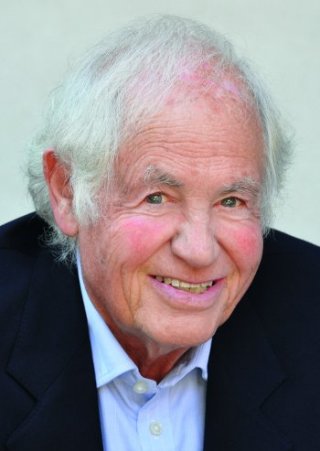
Peter’s memorial service was held on June 9th is Basel, Switzerland. His family invited Evi Guggenheim Shbeta of NSWAS to attend the gathering and share her memory of Peter during the memorial service. The Dreyfus family requested that guests donate to Neve Shalom - Wahat al-Salam in Peter’s honor, in lieu of sending flowers.
Primary School
The life of the school has been well-captured this year in a colorful newsletter for parents, though unfortunately this is only in Arabic and Hebrew. Carmella, the principal writes in there in the introduction:
Another school year has ended and the long summer break is before us, which brings with it free time for family and friends, vacations, time for our favourite pastimes and time to do nothing at all, which is of no less importance… This was a special and interesting year which brought special gifts: the school vegetable garden, which succeeded so well thanks to you, and whose product we enjoyed in a special meal; the school band which appeared before the school and at a performance of regional orchestras; and the outdoor stage whose completion was formally inaugurated with the end-of-school-year parties. For the first time [in recent years] we will be operating a summer camp… We are already in the midst of preparations for the next school year… The Regional Council has already placed us in its 2019 plans for completion of construction of 12 classrooms and 12 additional future classrooms for higher grades. This is a long term process… “
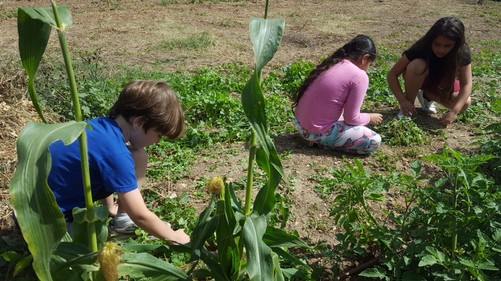
The school year ended with class parties and graduation of 27 children from the 6th grade class. Over the summer, we will be adding new classrooms needed by the beginning of the school year in September. We will accomplish this by taking over the prefabricated building now occupied by the nursery and pre-kindergarten. These will be relocated to the village entrance in the building now used by the Ahlan cafe (regarding which see below). The cost of the renovation work will be 250,000 shekels ($69,000).
During recent years we have been transitioning from a framework of one class at each grade level to two, which means that the student population has been gradually growing. From grades 1 - 4 there are already two classes. This year we expect approximately 56 first graders to start the school year, bringing the number of children in the entire system (from nursery to 6th grade) to about 270 children.
Also at the pre-school level we are seeing an increase. One hundred and twenty children registered for the kindergarten this year, out of which we can accept only 35. Parents in the neighboring Gezer Regional Council waged a struggle, including a protest with a one day hunger strike (!) to get the mayor there to allow their children to attend our kindergarten (at the “compulsory kindergarten level”, i.e. 5 year olds). He eventually gave his permission for their children to attend during the coming school year.
There are two main fundraising challenges for the coming year. First, we need to find unbudgeted funding for an additional 28 teaching hours. This is due to a change in the Education Ministry’s allocation of teaching hours (affecting all schools). Our school is especially sensitive due to the comparatively lower teacher-to-student ratio and the extra demands of a bilingual and multicultural curriculum. Second, we need to add new school buses. Three buses had to be taken off the road and sold this year due to obsolescence. One large bus remains, and we are seeking funding for two minibuses / or one midi-bus. After the amount already been raised, we still require about 600,000 shekels ($165,000). We will try to raise this money through a crowdfunding campaign.
Additional challenges for the school this year will be integrating eight new teachers, some of whom will be accommodated in the village. There is always a problem in finding good staff for our program due to the fact that teachers cannot receive the specialized training for bilingual schooling at teacher training colleges. We approach this challenge in two ways. First we are in the process of developing formal bilingual, binational curricula for the school, which will be documented in teacher’s packs in both languages, for each subject. This year, we were fortunate to receive another large grant for this ongoing effort from Fondazione Sanzeno in Italy. During the summer, we will be translating some of the curricula that has been written up in Hebrew into Arabic, so that we will have the teachers packs ready by the beginning of the school year.
The second investment in teachers involves teacher training and guidance. This too is necessarily an ongoing year to year effort. In the coming year, we will be working with an institute of educational philosophy and the Pluralistic Spiritual Community Center to create a framework of supervised mentoring for teachers by senior teachers. We will also be providing Arabic instruction for Jewish teachers, because an additional hurdle for accepting new Jewish teachers is their tendency to lack proficiency in Arabic.
Despite these several challenges our teachers and students look forward to another year of growth, creativity and development.
School for Peace
The School for Peace has completed another successful year of new and ongoing programs.
On April 21, a third group completed a Mixed Cities Program. Eleven Arabs and 10 Jews took part. We feel that the Program achieved its goals. In their written evaluations, participants said that the program increased their knowledge and awareness of the conflict. They collaborated on the development of five joint projects, which they will implement together in their communities. Even after the conclusion of the program, the participants remain in contact with each through through telephone messaging and social gatherings.
Also this Spring, the SFP has begun to implement a new program that brings together academic researchers and activists. The academics are specialists in intergroup conflict, binational encounters, and critical dialogues, and the activists are leaders of NGOs dedicated to peace activism and the development of a shared society.
The SFP has already conducted two meetings with program participants. Approximately 70 people attended each of these workshops. During the seminars, academics and activists discussed challenges related to conducting field research and carrying out peace activism efforts in their communities.
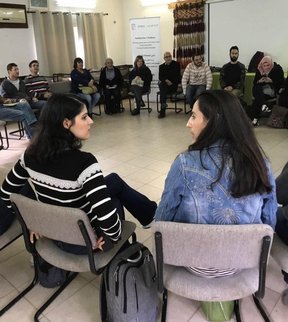
As the program continues, the participants will identify ways in which activists can help academics carry out their field research and become more involved in community work . Additionally, they will develop strategies to engage more students and young people in peace activism and the building of a shared society.
In February 2018, SFP staff hosted a second, three-day youth encounter program for Arab students from Galilee Nazareth High School and Jewish students from Ramat Gan High School in the Village. Fifty seven students - 30 Arab and 27 Jewish – participated. As a direct outgrowth of their students’ experiences during their encounters, teachers from both high schools reached out to the SFP and inquired about holding a seminar specifically for the schools’ educators. At their request, the SFP conducted a two-day workshop for the teachers in the spring. Thirty two teachers attended the workshop during which they toured the Village, learned about negotiation, and developed their intergroup dialogue skills.
We are excited to report that the majority of the teachers expressed a desire to participate in an additional training during the 2018 – 2019 school year. The SFP has committed to provide this follow-up seminar for the teachers next year. Our work with teachers from Galilee Nazareth High School and Ramat Gan High School is especially important because it is the first time in five years that the SFP has engaged directly with high school educators through encounter workshops.
“Quotations from teachers
Meron: "I am very happy that this meeting took place as it did. It’s the humanity that has to be remarked upon … We are almost identical in everything: pain, feelings, emotions .....we understand everything when we open up and hear the experiences of others .. We will make an effort to continue to meet. Tomorrow morning I’m going to tell my students about my personal experience and what I went through ...... "
Abir: "I wish for all of us that in another 70 years our grandchildren and great-grandchildren will sing a common anthem."
Nadira, teacher of 10th, 11th, 12th grades): "A pleasant and hopeful feeling / optimism. Even if we are not the ones in power, we are an essential part of society and everything starts with education and from educators. I hope everyone in the domain of families and education will take part and remain dedicated. Most of us are experienced and the future is in our hands.”
Siham: As Mahmoud Darwish said, "We love life - despite all the difficulties and obstacles / barriers - we still love life ... let us live".“””
In September 2017, the SFP was awarded a three-year grant from the United States Agency for International Development (USAID) to implement the program, Building Peace and Resilience. Over the course of three years, a total of 120 Israeli Arabs, Palestinians from the Palestinian Authority, and Israeli Jews will participate in the program in three groups.
The SFP has conducted the first three activities with the first group of 40 mental health professionals, which is composed of 8 Israeli Arabs, 16 Palestinians from the Palestinian Authority, and 16 Israeli Jews. Till now, members of the group I have participated in an initial preparation meeting, a five-day intensive dialogue workshop in Aqaba, Jordan, and a three-day training for working with groups in conflict in Beit Jala.
The SFP is in the process of concluding its Up and Coming Politicians Program, which was sponsored by a three-year grant from the European Union’s European Partnership for Peace Program. A total of 118 individuals - 47 Palestinians from the Palestinian Authority, 26 Palestinian Citizens of Israel, 345 Jewish Citizens of Israel - participated in the program.
About a recent seminar, SFP director Nava Sonnenschein writes:
Together with the (Palestinian) Inmaa organization, we conducted a 5 day seminar on negotiations towards a permanent settlement between the two peoples. We discussed important subjects in a framework of intensive negotiation. The participants arrived at significant agreements on the subject of Yerushalayim / El Kuds, historical justice and refugees, sovereignty , borders and natural resources. We hope that our participants reach key positions in Israel and Palestine and can advance these solutions on the macro level.
Overall, the program has been successful in engaging young adult leaders from Israel and the Palestinian Authority more deeply in the political process of addressing issues of peace.
Meanwhile, the SFP is continuing to conduct its social media skills and activism program for Arab and Jewish women . The program will continue till the end of October.
School for Peace wins the Goldberg Prize: On June 13, Nava Sonnenschein and Harb Amara of the School for Peace (SFP) were awarded theInstitute of International Education’s 2018 Victor J. Goldberg Prize for Peace for their leadership of the Change Agents Program for Jewish and Palestinian Professionals.
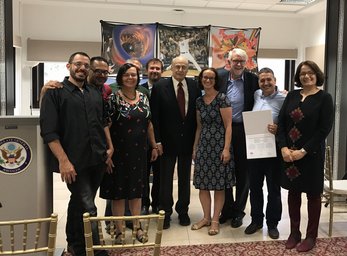
Nadi Youth Club
Twenty five youth participated in the Nadi Youth Club during the 2017 - 2018 school year. The Nadi provided the young people with extracurricular activities, including programs in sports, the arts, theater, meditation and communication, and nature exploration. On August 5th, members of the Nadi Youth Club will perform a reproduction of the old story of the Judgment of King Solomon. We are excited about, and looking forward to, this event!
In May, we said goodbye to Laila, who volunteered with the Nadi Youth Club for 8 months and during this time fulfilled a valued role in our community. We are grateful for her contributions to NSWAS! Bisan Tibi is coordinating Nadi throughout the summer.
Pluralistic Spiritual Community Center
The PSCC conducted several events in recent months. Continuing its cooperation with the Van Leer Institute, it held three book launches: for
The Children Laugh
, the Hebrew-Arabic edition of a children’s book by Syrian author Zakaria Tamer; for Manar Hassan’s book
Hidden from the Eye – Palestinian Women and Cities
and for
Rescuers of 1929, Stories of Rescued Jews and Palestinians in Hebron
.
The PSCC also organized a screening of the film “Sar’a” by Michael Kaminer, which tells the story of his discovery of the earlier existence of the Palestinian village upon which whose lands his kibbutz was founded. Sar’as 400 inhabitants were evacuated in July 1948.
Communications and Development Office
Back in September, Jacky Sherman, who worked for the office 6 years ago, rejoined our team. Alexandra Hawkins, who is taking a short break from her work on a doctorate in education from Columbia University has also joined us for an internship.
The C&D office has been busy developing new connections and opening new avenues of support. Among recent successes has been winning a first time grant from the Italian foundation, Fondazione Sanzeno for curricula development of the Primary School. We have formed a new partnership with the German Friedrich Ebert Foundation, which has provided partial funding for a new SFP women’s media program for Arab and Jewish women.
Visitors’ Center
The WAS/NS Visitors Center is the main provider of information on the village and its message for local and foreign visitors.
Daily, wev receive groups, journalists and individuals from around the world. Some 3,000 visitors have visited since January 2018. Among these, 1,300 were Israelis from high schools, universities, colleges and institutions. Over the past few years we have seen a big rise in Israeli visitors.
Two Israeli groups who visited recently have great potential for generating further group visits: a group of 42 tour guides from Yad Ben Zvi Institute in Jerusalem and b) a group of 80 school inspectors who came to learn about the village and especially the school. They want to explore further opportunities for cooperation.
We are working with WAS-NS Friends Associations to help expand their circle of supporters by arranging annual tours for groups from their countries. The program includes time spent in WAS-NS and excursions that provide deep first hand learning of issues behind the Palestinian – Israel conflict.
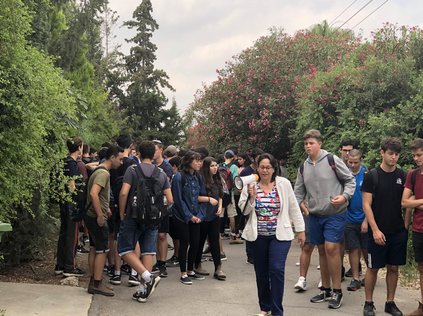
We are training young WAS-NS members to speak about the village and its educational work so that they can represent these internationally. They are encouraged to join visiting groups and participate in meetings with journalists and heads of institutions.
We are seeking a volunteer to work closely with the director to help with logistics and preparations of group visits. This work will also qualify the volunteer for an active role with the Friends Association in his/her country.
We hope to produce a short up-to-date film about the village to be shown to groups and be included in the information kit our representative take abroad.
Speaking tours and delegations
In April, Bissan and Gal, Two young members of WASNS created waves in Italy, during a tour hosted by the Italian Friends of the village. Their visit was widely reported in the media, including the La Stampa newspaper and Rai Play Radio. See website article:http://wasns.org/bissan-and-gal-in-italy
Also in April, Samah Salaime, who directs the communication and development department, traveled together with Noam Shuster to the United States to attend the "J Street" conference and to help our American Friends Association to promote the work of the village. She also visited Sweden at the invitation of the Swedish FA. In June she traveled to Spain (see below)
In June, Samah toured Spain and attended the Safavid Israel Institute Conference. Additionally, she attended a presentation by Fredel Romano at a conference sponsored by the Sefarad-Israel Center at the University of Sevilla. Samah is happy to report that she planted the seeds of what she believes will be a fruitful relationship with Fredel. She will continue to be in contact with Fredel in order to spread awareness about NSWAS throughout Spain.
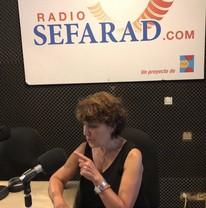
Please click here to listen to Fredel’s interview with Radio Sefarad during which she discusses her connection to, and work with, NSWAS.
In April, Sid Topol, an American innovator, entrepreneur, and philanthropist, toured NSWAS. During her spring tour of the United States, Samah met with Sid. As a direct result of Sid’s visit to the Village and Samah’s follow-up meeting with him, Sid has agreed to sponsor a conference on nonviolence in Israel/Palestine. NSWAS will host the conference, which will take place in October 2018.
Samah Salaime and Roi Zilberberg will lead the planning and implementation processes for the Conference. Initial conference activities include lectures from international experts and activists; panel discussions and presentations from academics and NGO/nonprofit; and interactive workshops, seminars, and exhibitions. The goal of the Conference is to inspire and train the next generation of peace and nonviolence activists in our region.
Visits by members of the village to the US and Europe led to a number of news reports, which are gathered on the WASNS website at http://wasns.org/-media-reports-
Municipal Council and Community
Wahat al-Salam - Neve Shalom may be an “ideological community” but there is a wide variety of opinions among its members on many issues that relate to our shared society, both in the village and in the region. In order to help in airing and processing these views, we sometimes run facilitated dialogue sessions. In recent months.we have been running a series of three such meetings facilitated by Nihaya Daoud and Yoni Naftali. The meetings have dealt with the creation of a kind of constitution for the village and the rules of engagement for a binational dialogue. The last of the series will be held in September.
On a lighter note, the World Cup events created a useful period of bonding among soccer fans. Important matches were broadcast live in the evenings outdoors by the swimming pool, so that any passerby could hear periodical screams and roars emanating from that area. This period of intense enthusiasm will leave a lasting mark on the village: inspired by the event, we decided to create for the first time a proper football field at the bottom of the natural amphitheater at the center of the village. As one of his last responsibilities before retirement in September, Dr. Eitan Kremer can be seen below preparing the new soccer field.
Eitan is retiring after 40 years of working for the village in a variety of formal and informal roles. Since the early 1990s he has been in charge of landscaping and public sanitation, so much of the beauty of the village, from the palm trees at the entrance to rose gardens, herb shrubbery and community landscaping around important buildings are thanks to his diligent and long-lasting efforts. But in his spare time he has always been involved in voluntary positions too, including his present role as Chair of the Educational Institutions. After retiring he hopes to give even more time to this function. In recent years he has also given considerable time to looking after the needs of our nonagenarian village co-founder, Anne Le Meignen.
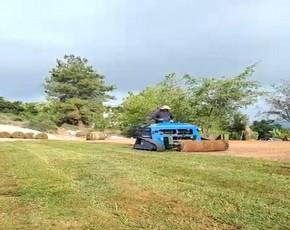
As mentioned above, Cafe Ahlan, which is privately owned by Rayek and Dyana Rizek, will need to relocate soon. This is unfortunate because the cafe has given that corner of the village a distinctive ambiance of hospitality and grace. It’s both the place where Rayek largely wrote his book,
The Anteater and the Jaguar
, and it features prominently in its pages. It is necessary to move the cafe in order to strike a deal with the Israel Lands Administration, which formally owns the land in that part of the village. The agreement requires us not to use this land for commercial purposes. In the coming weeks we will move the cafe to a new location close by the hotel.

